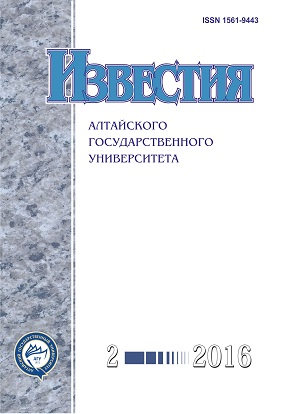Provisional Government Policy in the “National Question” Solution: the Approaches and Methods of Implementation of the Regional Options
Abstract
The article presents an analysis of the “national policy” of the Provisional Government. The events of the February Revolution exacerbated a number of problems associated with the national question in the state, and these events led the new government to necessity to develop and implement policies to meet the requirements of the time. The national policy of the Provisional Government was based on the party ideology of the Cadets, the Octobrists, the Socialist-Revolutionaries, and was an eclectic approach to solve the “national question.” The Provisional Government defended the idea of the indivisibility of Russia, so in the very first policy documents abandoned the idea of the empire’s disintegration on the national basis, and the solution of the “national question” was seen in the provision of cultural autonomy, the development of language and ethnic identity of the peoples from the national borderlands. The Provisional Government sought to develop the variability approach to the national question in large ethnic regions: Poland, Finland, Ukraine, Central Asia and Kazakhstan. However, the rise of nationalism in the borderlands of the Russian State, the spread of the ideas of regionalism required more fundamental changes. Therefore, the course chosen by the Provisional Government, did not find support in the society, and democratic initiatives were not enough in the time of difficult inter-revolutionary period. The confidence in the preservation of Russia undivided, the inertia of the control system, the loss of control over the national situation in the state led to the failure of the Provisional Government’s policy in the national sphere.
DOI 10.14258/izvasu(2016)2-01
Downloads
Metrics
References
Бурмистрова Т.Ю., Гусакова В.С. Национальный вопрос в программах и тактике политических партий в России. 1905–1917 гг. — М., 1976.
Милюков П.Н. Воспоминания. — М., 1991.
Полный сборник платформ всех русских политических партий. С приложением высочайшего манифеста 17 октября 1905 г. и всеподданейшего доклада графа Витте. — М., 2001.
Политические партии России: история и современность. — М., 2000.
Сталин И.В. Октябрьский переворот и национальный вопрос // Сталин И.В. Cочинения. — Т. 4. — М., 1947.
Старцев В.И. Внутренняя политика Временного правительства первого состава. — Л., 1980.
Архив новейшей истории России. Серия «Публикации». Т. VII. Журналы заседаний Временного правительства: Март — октябрь 1917 года. В 4т. Т. 1. Март — апрель 1917 года. — М., 2001.
Революция и «национальный вопрос»: документы и материалы по истории национального вопроса в России и СССР. — М, 1930.
Трофимов Е.Н. Россия многонациональная. — М., 2013.
Лысенко Ю.А., Анисимова И.В., Бочкарева И.Б., Лысенко М.Ф. Элементы европейской политической культуры в центральноазиатских национальных окраинах Российской империи: особенности восприятия инокультурных инноваций (конец XIX — начало ХХ в.) // Былые годы. — 2015. — №4.
Yuliya Lysenko, Inna Anisimova, Elena Tarasova, Marina Lysenko. The Results of Social and Economic Modernization of the Central Asian National Outskirts of the Russian Empire as a Resource for Forming Ethnic Identities // Mediterranean Journal of Social Sciences. — 2015. — Vol. 6. — №6.
Izvestiya of Altai State University is a golden publisher, as we allow self-archiving, but most importantly we are fully transparent about your rights.
Authors may present and discuss their findings ahead of publication: at biological or scientific conferences, on preprint servers, in public databases, and in blogs, wikis, tweets, and other informal communication channels.
Izvestiya of Altai State University allows authors to deposit manuscripts (currently under review or those for intended submission to Izvestiya of Altai State University) in non-commercial, pre-print servers such as ArXiv.
Authors who publish with this journal agree to the following terms:
- Authors retain copyright and grant the journal right of first publication with the work simultaneously licensed under a Creative Commons Attribution License (CC BY 4.0) that allows others to share the work with an acknowledgement of the work's authorship and initial publication in this journal.
- Authors are able to enter into separate, additional contractual arrangements for the non-exclusive distribution of the journal's published version of the work (e.g., post it to an institutional repository or publish it in a book), with an acknowledgement of its initial publication in this journal.
- Authors are permitted and encouraged to post their work online (e.g., in institutional repositories or on their website) prior to and during the submission process, as it can lead to productive exchanges, as well as earlier and greater citation of published work (See The Effect of Open Access).








